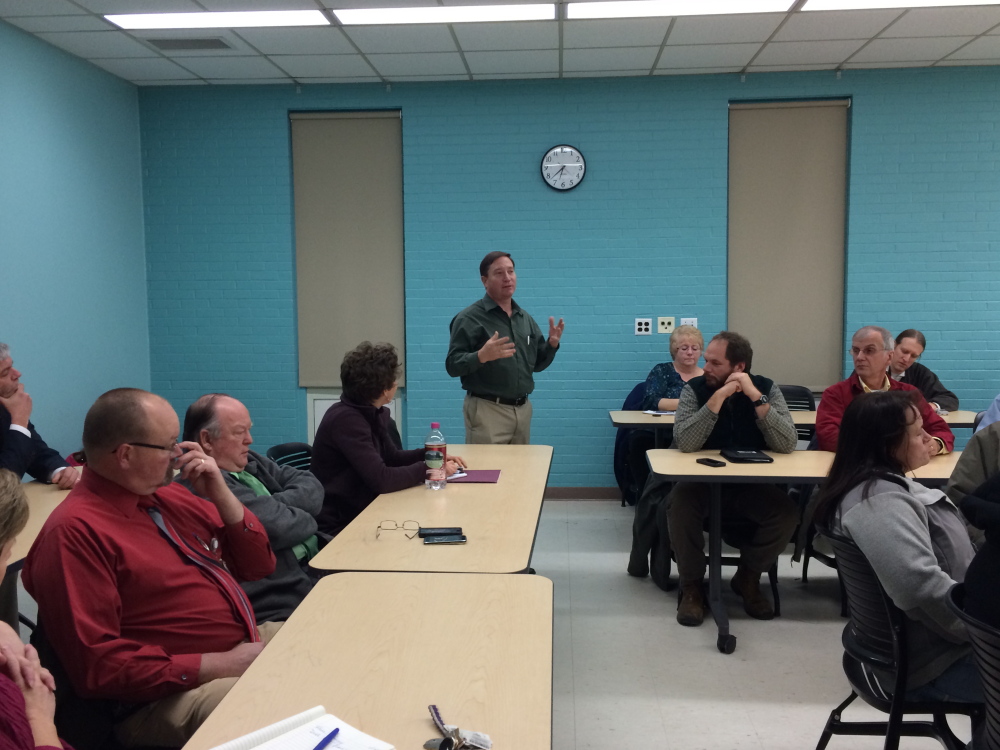FARMINGTON — Following recent news that Summit Natural Gas of Maine will be unable to meet a deadline for bringing natural gas to Franklin County, community members gathered Wednesday night at the University of Maine at Farmington to discuss alternative energy sources.
About 50 people attended New Directions in Farmington’s Energy Future, a forum organized as a way for the campus and the community to gain feedback on ways to reduce dependence on heating oil and explore more cost-effective and environmentally friendly energy sources.
“There have been lots of changes in energy on the local, state and regional level,” said Luke Kellett, a member of the Sustainable Campus Coalition, which hosted the event. “Part of that in Farmington includes the recent news from Summit.”
Earlier this month, Summit Natural Gas of Maine, a company that recently completed a 68-mile natural gas pipeline from Pittston to Madison and originally had plans to come to Farmington, announced that it wouldn’t be able to fulfill a commitment to bring natural gas to UMF by 2016. If the university, the largest potential customer in the county, does not connect to the pipeline, the company has said it will not serve other customers in the county.
“All fuels and all possibilities are on the table. Whether it’s biomass or oil, we feel the need to make the best decision for us and for the community. That’s why this meeting is so important,” said Jeffrey McKay, director of facilities management at UMF.
Much of the discussion Wednesday night centered around getting away from oil, the use of wood pellet boilers and the possibility of diversifying energy sources on campus.
“We live in a really exciting time, because there’s a lot of energy sources available and we wouldn’t necessarily have to use just one source on campus,” said Bill Crandaw, a Farmington resident and program manager at Western Maine Community Action.
Crandaw said wood pellets would be a good heating option because they are made locally, thus supporting the local economy, and already have proved to provide financial and energy savings at many area school districts.
Jeff Allen, manager of Geneva Wood Fuels, a producer of wood pellets in the nearby town of Strong, said the growth of his company since it started in 2008 highlights the success of wood pellet boilers as a heating source.
“We’ve grown 10-fold,” said Allen. “It’s a very simple system. Europeans are doing it all over the place.” Allen said the company started with seven to 10 employees and now has 27. It also started with about 20 to 30 customers and now has more than 100.
“It’s been an absolute success story and it’s created jobs locally,” said David Leavitt, director of support services for Farmington-based Regional School Unit 9, of the wood pellet system the district uses. “It’s not a surprise natural gas isn’t coming. There is a shortage of natural gas in New England.”
Sen. Tom Saviello, R-Wilton, said he, too, supports the use of wood pellets.
“What we need to look at is how the community benefits,” he said. “It’s local people harvesting the wood. We have local harvesters, local truckers and a facility just up the road to make wood pellets. It really benefits the whole area.”
Several people also brought up the possibility of using heat pumps as an alternative energy source.
Paul Stancioff, a professor of physics at UMF, said he uses a heat pump to heat his home and has totally eliminated his oil bill, although his electric bill has increased. Still, he estimates the cost of operating the heat pump, which uses electricity to pump heat into the house, to be about one-third that of heating it with oil. It also has reduced his family’s carbon footprint by about 20 percent to 30 percent, he said.
“It’s a good system. It was expensive to install, but it has paid for itself over about six winters,” he said.
After the discussion, UMF president Kathryn Foster said she thought the feedback from the community, the faculty and the staff would help the school’s energy committee make a decision on how best to heat the campus.
“Open forums like this and discussions are an important part of any campus,” she said. “There was a terrific mixture of people, and we heard from a lot of people we may otherwise not have heard from.”
Mike Duguay, director of business development for Summit Natural Gas of Maine, said in an email that the company is still open to working with the university despite the delay.
“We welcome the opportunity to continue discussions with the University of Maine at Farmington about their interest in natural gas, a decision that could provide the opportunity for residents and businesses in the region to lower their energy costs by switching to natural gas,” he said. “In the meantime, our crews are working diligently on the installation of pipelines for businesses and residents in the communities we serve.”
Rachel Ohm — 612-2368
Twitter: @rachel_ohm
Send questions/comments to the editors.




Success. Please wait for the page to reload. If the page does not reload within 5 seconds, please refresh the page.
Enter your email and password to access comments.
Hi, to comment on stories you must . This profile is in addition to your subscription and website login.
Already have a commenting profile? .
Invalid username/password.
Please check your email to confirm and complete your registration.
Only subscribers are eligible to post comments. Please subscribe or login first for digital access. Here’s why.
Use the form below to reset your password. When you've submitted your account email, we will send an email with a reset code.